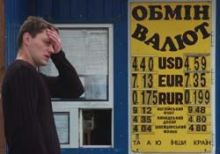After deferring its May 22 meeting, on Wednesday the Board of Directors of the National Bank of Ukraine (NBU) resolved to set the hryvnia’s official exchange rate at UAH 4.85/ USD 1.00 as of May 22. This is nearly four percent lower than the previous rate of 5.05/1.00, which has been in effect for more than three years, since May 21, 2005.
For the first time in its history the NBU’s Board of Directors vetoed this resolution and instructed the management to restore the official rate as of May 23, without exceeding the UAH 4.95-5.25/USD 1.00 limit. Chairman of the Board Petro Poroshenko did not oppose strengthening the hryvnia in principle. He noted that early measures to strengthen the official exchange rate would allow the optimization of Naftohaz Ukrainy payments for gas deliveries to Ukraine.
He also said that securing the stability of the national monetary unit in the period from January to April encountered a number of complications. He explained that containing price increases will not be possible because of the absence of a coordinated stand on the part of state agencies responsible for price stability. The government’s efforts to lower the rate of increase of the money supply has led to certain problems in the banking sector and failed to combat inflation. In Poroshenko’s opinion, “even now we can see certain problems in the banking sector because of the lack of money.” He stressed that the monetary deficit is not an anti-inflation factor because manufacturers’ losses, which have been inflicted by the exchange rate, are being tacked onto the price of their products.
On May 22, Volodymyr Stelmakh, Governor of the National Bank of Ukraine, called an emergency briefing before the end of the meeting, telling journalists that the bank’s management had unanimously overridden the NBU Board’s veto (the law requires at least two-thirds of the vote). He added that the Board’s decision was bolstered by correct economic and legal arguments. In keeping with current legislation, the Board is in no position to issue recommendations to the bank’s management about the official exchange rate.
Holding the text of the law, Stelmakh explained to journalists that it is within the Board’s jurisdiction to draft the basic principles of credit-monetary policy and exchange rate prognostications that differ from the official exchange rate, but not to determine the official rate. “They’ve confused the rates,” said Ukraine’s number— one banker. He then revealed the crux of the problem. He is convinced that the National Bank did not revalue the hryvnia’s exchange rate but simply went along with the market trends, considering that the market has lately tended to strengthen the hryvnia.
The Governor of the NBU explained that this decision was made with an eye to the inflation dynamics in Ukraine. Stelmakh believes that the population will not suffer because of the hryvnia’s strength, since Ukrainians’ hard currency deposits currently amount to 73 billion hryvnias, whereas bank loans total 117 billion. In his opinion, the main thing is that the National Bank’s decision will make it possible to lower the inflation rate by at least three percent, and that all Ukrainians will benefit from this.
Meanwhile, on May 22 the NBU management’s decision was not accepted either by the bank’s Board of Directors or the Presidential Secretariat. The Party of Regions intends to submit a vote of no confidence in the Governor of the NBU. Oleksandr Shlapak, first deputy head of the Presidential Secretariat and former deputy governor of the NBU, also believes that “such measures yield results precisely when the economy is overheated, one of the symptoms being overproduction. Ukraine is registering absolutely the opposite trend: lack of supply to satisfy demand.”
Shlapak reminded his listeners that there is already a problem of a debit balance in the foreign trade balance sheet, which will become critical after revaluation. This is precisely why a number of experts are pointing to the inevitability of exchange rate devaluation in the nearest future. “Rocking the exchange rate boat is the last thing our economy needs today,” declared Shlapak, adding that the main anchor of economic stability, the stability of the national currency, has been seriously damaged.
Needless to say, the National Bank of Ukraine does not expect that this complicated decision will be welcomed by the public. After the briefing with the members of the NBU’s Board of Directors, The Day asked them the following question. “You’re saying that this decision will serve the interests of business, particularly exporters. Then why should important and experienced people who are on the Board of Directors and in parliament oppose it?” Their reply was: “Atavism has reared its head in business friendships, and so has their obvious politicization.”







